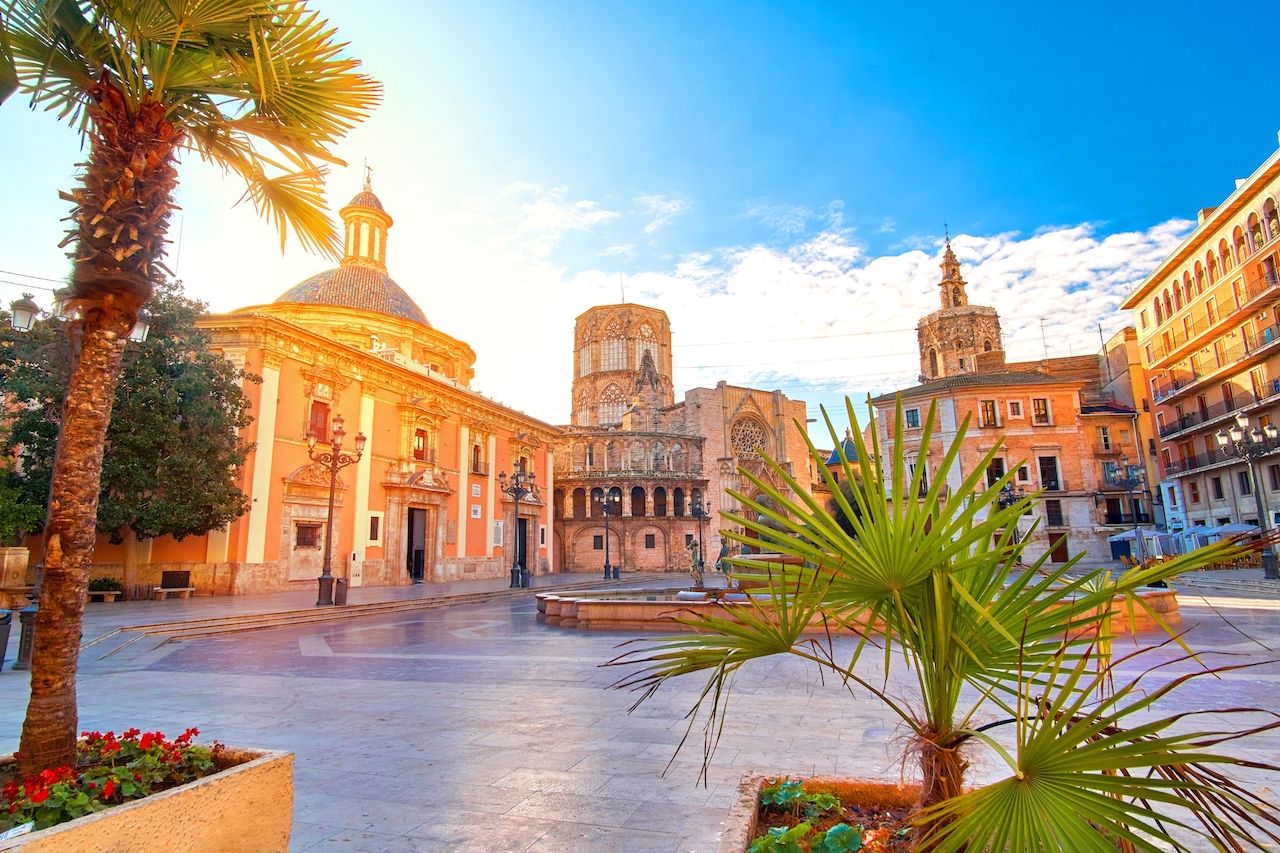Valencia, Spain
Modern City Valencia: Language, Nation, Gender, Identity
Valencia, Spain
Summer 2024: June 16 - July 14*
*dates subject to change

Program Description
Valencia, a vibrant city located on the east coast of modern-day Spain, lives between tradition and innovation. It has been an important stage of historical events, social conflicts and struggles, proud of its role in the labor movement, its legacy of anti-fascism, struggles for gender equality, and diverse feminist activism. It is also known as the City of Arts and Sciences which hosts the futuristic complex of modern buildings designed by renowned architect Santiago Calatrava. This program takes students to Valencia to explore how the city lives in the many complexities of modern citizenship: Valencia’s bilingualism (Valenciano and Castilian); its citizens’ identity formation; ideas of queerness and gender (non)conformity; histories of migration and citizenship; their relationship to capitalism, democracy, and nationalism. Observing, participating in, and analyzing the different faces of the city of Valencia, students will explore how their knowledge of cities and the world changes.
Students from all majors are encouraged to apply.
Information Sessions
Information sessions will be held from 1:40-2:55 (community hour), via Zoom. Click HERE to join.
- Wednesday, March 6
- Monday, March 18
- Tuesday, March 26*
*March 26 info session will also be in-person in the conference room on the 5th floor of Haaren Hall, room 531
Undergraduate Courses
LIT 287: Modern City, Language, and Nation in Valencia (3 credits)
Prof. Olivera Jokic
Can one shared language make a nation? This course thinks about the role of language in nationalism, and looks at Valencia as an example that far predates the US obsession with getting everyone in one country to speak only one language. At a moment of a great migration of humans and technologies across the world, having just one national language is the tradeoff for having cultural differences in a nation. Valencia is one of the cities and regions in modern Spain that cultivate an entire culture in a language that isn’t the dominant language of the country, the “Castilian” Spanish. What does this look like in practice? What does it mean to resist assimilation into the dominant culture and national identity?
GEN 385: Gender, History, Identity in Valencia (3 credits)
Prof. Giazú Enciso Dominguez
This experiential learning course sends students to conduct a field study in the city of Valencia. Visiting different neighborhoods, historical and contemporary hotspots, students will analyze the different scenes they encounter, using various ways of thinking about the relationship between gender norms and other social norms of human behavior (social constructionism, intersectionality, queer theory, etc.). Putting students in touch with faculty from the Universitat de Valencia and activists from a local Feminist Co-Op, this course will be an experiment in embodied learning, connecting theoretical knowledge to our everyday experiences.
Students are required to take both classes as part of this study-abroad program for a total of 6 credits.
Prerequisites
- 2.75 GPA
- ENG 101
- Spanish a plus, but not a requirement
Application
You can access and start your application here.
Application Deadline: Monday, April 1*
*IMPORTANT: Please submit at least part of your application before Thursday, March 21 as we need a count of applicants by then.
Please note: An application fee of $50.00 is due at the time of application. It can be paid by debit or credit card. Money orders, personal checks and cash are also accepted. Applications will not be accepted if incomplete.
Program Cost
Estimated Program Fee: $4,500**
**Subject to change. Includes single studio student accommodations, international health insurance, excursions and transportation on-site associated with program, and various API student services. Does not include tuition, airfare, meals, textbooks, personal expenses, personal excursions, etc.

John Jay College Tuition and Fees
Undergraduate Tuition and Fees
Financial Aid & Scholarships
Students should make an appointment with the Financial Aid Office, at their home College, to discuss the applicability of their financial aid to this program.
More information on scholarships and funding can be found on our Study Abroad Funding page.
JJC students can contact Michael Scaduto for more information regarding the JJSAS, and general scholarship opportunities, at 212-237-8872 or email at mscaduto@jjay.cuny.edu.
Program Notes
- Housing: Students will stay in single-occupancy studio accommodations.
- Fluctuating exchange rates and other fees may lead to program cost changes.
- Program cost is based on a minimum number of participants for the program.
- Students should discuss applicability of financial aid with the Financial Aid office.
- All CUNY students must meet with their study abroad advisor to be sure the proper e-Permit registration process is followed.
- All non-CUNY students are encouraged to apply early, to be sure there is ample time to apply and register for classes at John Jay College. Please contact OISP for more information regarding the application process. Please note: Tuition rate per credit is different for non-CUNY students. More tuition information can be found here.

- Refund Policy: Payment of the program deposit indicates the student understands and agrees to the Office of International Studies & Program’s payment and refund policies. Students who withdraw from a John Jay College program after confirming participation, but before the program begins, will lose the non-refundable deposit and any unrecoverable costs: students will be refunded 50 percent of program fees 30 days prior to the program start date, and 25 percent of program fees 14 days prior to the program start date. After the start of the program, no refunds will be provided, and the student is responsible for all program fees. If the program fee is not paid in full, there will be a hold placed on her/his CUNYfirst account.
- For faculty-led programs, tuition refunds will be granted following the College’s policies. For more information, click here.
- College-based funders retain the right to recoup funds from the student account if the student does not follow rules of the CUNY Travel Waiver & Release Form, uses the funds for other purposes, or withdraws from the program. Students must understand that they are responsible for full payment of the amount owed to the department.
- The Office of International Studies and Programs (OISP) has the right to modify or cancel the program, including changes to the program dates, costs, scheduled visits, program itinerary, etc., as dictated by economic and/or political situations, etc.
- Students are responsible for purchasing their own airfare, and for their itinerary. Due to possible changes in program dates/itinerary information, students are not to purchase airfare until prompted by OISP.
- Students are encouraged to apply early, due to limited space.
- Information is tentative, and subject to change*, **program cost(s), syllabi, *dates, etc.
Health Information for Travelers to Spain
It is important to be aware of the health information provided by the US Center for Disease Control and Prevention. All vaccines should be up to date, and it is important to check the vaccines and medicines list and visit your doctor (ideally, 4-6 weeks) before your trip to get vaccines or medicines you may need. Ask your doctor what vaccines and medicines you need based on where you are going, how long you are staying, what you will be doing, and if you are traveling from a country other than the US.
More information can be found on the Center for Disease Control website.
Please note that all travelers:
Should be up to date on routine vaccinations while traveling to any destination. Some vaccines may also be required for travel.
| Routine vaccines | Make sure you are up-to-date on routine vaccines before every trip. These vaccines include measles-mumps-rubella (MMR) vaccine, diphtheria-tetanus-pertussis vaccine, varicella (chickenpox) vaccine, polio vaccine, and your yearly flu shot. |
Please note that most travelers:
Get travel vaccines and medicines because there is a risk of these diseases in the country you are visiting.
| Hepatitis A | CDC recommends this vaccine because you can get hepatitis A through contaminated food or water in Spain, regardless of where you are eating or staying as outbreaks occur throughout the world. |
| Hepatitis B | Heptatitis B is spread through sexual contact, contaminated needles, and blood products. CDC recommends this vaccine if you might have sex with a new partner, get a tattoo or piercing, or have a medical procedure. |
For More Information
Prof. Olivera Jokic, Department of English (Academic Inquiries)
ojokic@jjay.cuny.edu
Ken Yanes, Dep. Director
212-484-1339, kyanes@jjay.cuny.edu
Daniel Braslavsky, Coordinator
212-887-6105, dbraslavsky@jjay.cuny.edu
studyabroad@jjay.cuny.edu
212-484-1390
Office Location & Mailing Address:
Office of International Studies & Programs
John Jay College, CUNY
524 West 59th Street
Haaren Hall, Suite 530
New York, NY 10019 USA